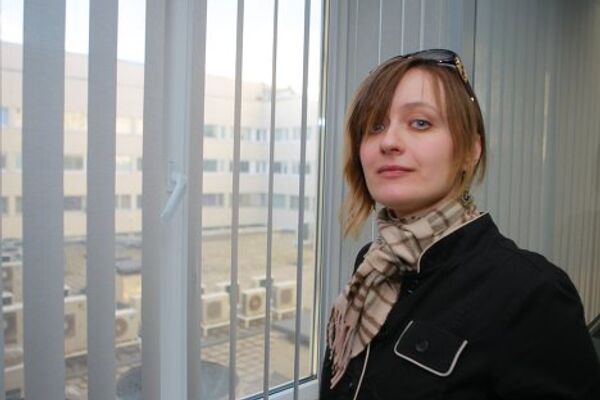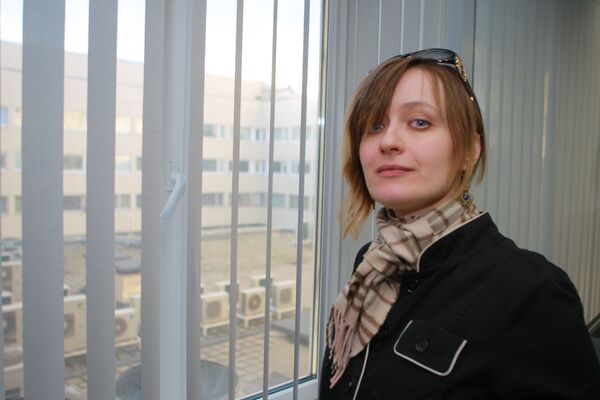Slowly but surely, the notion of a dignified death is catching on in Moscow. It is, I daresay, becoming fashionable to talk about it.
This week, the First Moscow Hospice (named this way because it was, indeed, the first) celebrated its 20-year anniversary. The hospice was also officially named in honor of its founder, the tireless and courageous doctor Vera Millionshchikova, who passed away in 2010.

At the anniversary celebration, I saw journalists and businesspeople, actors and activists. The mood wasn’t bombastic or triumphalist, but it was touching – and flowers seemed to take up every available surface, while children ran around, grabbing snacks from tables. The conductor for the Kremlin’s chamber orchestra, which performed at the event, recalled that at Millionshchikova’s wake, jazz music was played – and so the orchestra played jazz.
The atmosphere at the First Moscow Hospice was completely unlike that of your typical Russian medical institution – and, having visited the hospice before, I can attest to the fact that such an atmosphere is actually always present there. It wasn’t just about anniversaries and dedications – the First Moscow Hospice cultivates an aura of humanity, as opposed to cold severity. Security guards there don’t bark orders, staff who pass you in the hall don’t eye you with suspicion or rudely demand that you identify yourself should you linger by a painting in the hall, and relatives can visit their loved ones around-the-clock.
For most terminally ill Russian patients, death is still preceded by a lot of unnecessary suffering and pain. Palliative care and the hospice system remain grossly underdeveloped in the country. A lot of people who could die comfortably in a hospice, surrounded by loved ones, are forced to do it in a closed-off intensive-care unit, either surrounded by strangers or completely on their own. Russians’ treatment of death as a kind of taboo is a big culprit here – wanting a dignified death for one’s loved one or for oneself is still seen as “giving up,” a Soviet legacy that is hard to shrug off.
In that sense, it’s good to see celebrities grow increasingly aware of the First Moscow Hospice. It’s good to see hospice staff interviewed on television and in print. It’s good to see the topic of a dignified death in Russia beginning to grow into something trendy and commonplace.
Death needs to “sell out” – it needs to get mainstream airplay. Instead of being a topic for the anointed few, it needs to become as commonplace as weather updates and gossip on whatever it is that some famously volatile pop star has done now. Because for as long as death is kept an open secret, as something that at best happens behind seven locks in a hospital room that’s both out of sight and out of mind, Russian patients will continue to suffer needlessly.
Watching the autumn light filter through the tall windows of the hospice, I thought about one such patient. My great aunt Yevgeniya Andreyevna had been a great beauty in her day, a fiery redhead worthy of Rita Hayworth comparisons, an intellectual who quoted English poetry at dinner and kept colorful scrapbooks featuring her past loves. She was the daughter of a revolutionary and a general, had worked as a war-time translator and received a veteran’s honors. It was her dream that I come live in Moscow – in fact, she constantly nagged my mother about it – but she didn’t live to see the day.
When she got terminal cancer, Yevgeniya Andreyevna, or Auntie Zhenya, as I called her, withdrew from the world. She kept her worsening condition a secret – perhaps ashamed of her weakness and infirmity, though we never got to find out for certain. When the pain got to be too much, she called an ambulance and died in intensive care, with no one to hold her hand. “We couldn’t help her; no one could help her by the time she arrived here,” a doctor told my mother in the wake of her death.
There are far too many Auntie Zhenyas in Russia – glamorous and not-so-glamorous, urban and rural, old and young. They don’t know that there can and should be another way. For some, change will not come quickly enough. For others, there is now a growing sliver of hope.
Trendwatching in Russia is an extreme sport: if you’re not dodging champagne corks at weddings, you’re busy avoiding getting trampled by spike heels on public transportation. Thankfully, due to an amazing combination of masochism and bravado, I will do it for you while you read all about it from the safety of your living room.
Natalia Antonova is the acting editor-in-chief of The Moscow News. She also works as a playwright – her work has been featured at the Lyubimovka Festival in Moscow and Gogolfest in Kiev, Ukraine. She was born in Ukraine, but spent most of her life in the United States. She graduated from Duke University, where she majored in English and Slavic Literature. Before coming to Moscow, she worked in Dubai, UAE and Amman, Jordan. Her writing has been featured in The Guardian, Foreign Policy, Russia Profile, AlterNet, et al.
Trendwatcher: Pussy Riot and Prison Reform
Trendwatcher: Nerds Gone Wild: Argument Over Philosopher Kant Ends in Shooting
Trendwatcher: Moscow’s Aging Voters Defeat Its Apathetic Youth
Trendwatcher: Glamorous Fraudsters and Debt Suicides
Trendwatcher: The Scandalous Truth About Russian Men
Trendwatcher: Of Russian Tourists, Egyptian Violence, and Fate
Trendwatcher: Moscow’s Migrant Problem – And Lack of Community
Trendwatcher: Mizulina, Gay Activists – And Fame
Trendwatcher: Navalny and the Train Station Blues
Trendwatcher: Russia, Self-Defense and Trayvon Martin



